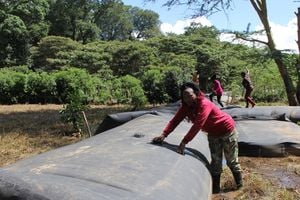Building resilience: How NCBA is helping to change the climate story of Africa
Sponsored by NCBA

NCBA Bank Nyali branch Assistant Relationship Manager Faith Ouma (left), and Kwetu Training Centre for Sustainable Development Board Chairperson Ulrike Neubert, plant a mangrove seedling at in Mtwapa, Kenya's coast, on December 3, 2022.
Climate resilience and the ability of people to live through the climate crisis are at the heart of NCBA’s sustainability agenda.
The Group’s citizenship strategy is aligned to its corporate culture and is anchored on the overall company strategy. It generally focuses on what we do to support community growth, how we plan to do this, and what resources are needed.
The strength and sustainability of our business is directly related to our social license to operate. NCBA’s Paperless approach and digitisation in our operations is a key agenda towards sustainable business practices.
At NCBA, we have a clear understanding that our values are geared at driving our vision and the promise we make to our customers, shareholders, employees, and community at large. Our citizenship strategy is firmly aligned to the global Sustainable Development Goals (SDG) and national growth strategies.
Change the story campaign
Since 1960s, many parts of Africa have experienced a general warming trend, reported as being about 1°C, or 0.21°C per decade. Rainfall patterns have also changed. The long rains have been declining continuously in recent decades. Droughts have become longer and more intense, and tend to continue across rainy seasons. Droughts in Kenya, for example, affect about 4.8 million people on average.
Climate change is likely to negatively impact future development and achievement of the SDGs. Despite their importance in combating climate change, forests across Africa face serious threats, ranging from illegal logging, encroachment, overexploitation, overgrazing, forests fires, pests, and diseases.
Kenya, for example, currently has a seven percent forest cover, which falls short of the United Nations recommended 10 percent.
NCBA’s hallmark sustainability programme, “Change the Story”, has established a one-million indigenous seedling nursery at Karura forest, and has contributed to planting of over 150,000 trees across the country.
NCBA’s goal is to support the Government’s initiative to grow Kenya’s forest cover to more than 30 percent by 2032.
Decarbonising the transport sector
NCBA is today making a more concerted effort towards adaptation and resilience building financing.
As part of our sustainability agenda and commitment to addressing the impact of climate change, NCBA, earlier this year, was the first bank to finance electric vehicles by creating a Ksh2 billion fund to finance 5,000 units.
The fund will go a long way in supporting the government to establish a clean, efficient, and safe transport system that will safeguard an eco-friendly future.
The fund is also part of the bank’s sustainability programme, which is aligned with the Paris Agreement on climate change and the United Nations’ 2030 Agenda for Sustainable Development.
Data by the Kenya National Bureau of Statistics (KNBS) indicates that registration of new vehicles increased to 107,499 units in 2021, from 94,128 units in 2020, a majority being imported used cars. Today, the country has an estimated two million registered vehicles. With a market share of 35 percent in vehicle financing, NCBA has an important role in reducing emissions emanating from the transport sector.
To accelerate transition to electric vehicles, NCBA Asset Finance has made it easier for its customers to purchase electric vehicles through its pioneering 15 seconds approval process. With this innovation, a customer will be able to get conditional approval within 15 seconds of digitally submitting their vehicle application via the bank’s digital platform.
These funds are being disbursed alongside ongoing investments in alternative energy solutions. A shift to electric mobility will also lead to the creation of employment; directly and indirectly in the automotive, electronics and IT industries, as well as in other sectors, such as in the deployment and operation of charging infrastructure, local assembly, and maintenance of EVs (electric vehicles) and recycling or reuse of the battery at the end of its (the battery’s) life.

New sustainability project
NCBA plans to invest more in research and knowledge generation around climate change. Our research suggests that climate finance is about more than just one aggregate number. The money must match the needs in terms of amount and purpose. NCBA will support sectors where it’s in a better position to deal with the impacts of climate change.
Given the focus on a low-carbon transition, we are exploring solutions that focus on growing the renewable energy space, promoting sustainable agriculture, waste management and circular economy products and electric mobility, among others. Solutions that address these sectors can significantly contribute to mitigating or adapting to climate change.
NCBA’s focus is to align to Kenya’s Nationally Determined Contributions (NDCs), as well as support similar moves by its subsidiaries across Africa. Kenya’s NDC seeks to tap 21 percent of the mitigation costs from domestic sources and the remaining 79 percent from international support, in the form of finance, technology, development, and transfer and capacity building.
NCBA has now embarked on a new sustainability project called “Project Klima.” This is a demonstration of our strong commitment and investment towards strategic planning on climate risk.
The magnitude and type of financing that will be needed to pay for climate change and mitigation will require financial institutions like ours to adopt a new approach to risk.
We want to be led by science to grow a brand able to leverage and build on knowledge gaps in climate risk assessments. The project is cross-functional, and the direction is being shaped by everyone in the various business units.
We will continue to seek more collaboration across the financial sector since this challenge is bigger than us and our balance sheets.


